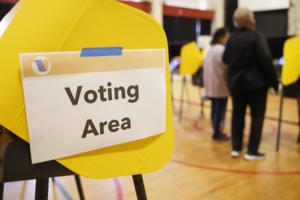Politics
/ArcaMax
David M. Drucker: Don't confuse the Iran war's MAGA critics with most Republicans
There’s a joke circulating in political circles opposed to President Donald Trump that encapsulates the dilemma facing some of his most ardent supporters in the wake of ongoing U.S. military strikes on Iran. The current variation goes something like this: “They told me that if I voted for Kamala Harris, we’d get more regime-change wars in ...Read more

Martin Schram: To the Republic for which we stand
Up at the podium, even knowing the whole world could be watching him, President Donald Trump may well have been bored with himself as he churned through the first half of his State of the Union address.
Oh, he had been dishing his usual load of made-up facts and numbers. And he made his usual claim: “Now we are the hottest country anywhere in...Read more

Editorial: War powers and the weight of the Constitution
The gravest power entrusted to any American president is the authority to command the armed forces. With that authority comes a constitutional tension that has defined our republic since its founding: Congress declares war. The president conducts it.
When an administration moves toward open conflict — deploying forces, launching sustained ...Read more

Adriana E. Ramírez: The war on Iran and the battle at your local bookstore
As a U.S. and Israeli-driven war in the Middle East that may change the world ramps up, it seems strange to care about books. But we have been telling stories as long as we have been conquering and defending civilizations, trying to make sense of the world that surrounds us, to understand how many have survived and made lives in the middle of ...Read more

John M. Crisp: A few more thoughts on Trump's State of the Union address
Can you bear a few more thoughts on President Donald Trump’s much-discussed State of the Union address last week?
Our nation’s views are divided, naturally, between citizens who loved it and those who hated it or at least took issue with parts of it.
Count me among the latter. But if I can find something nice to say about Trump, I ...Read more

Editorial: Trump's impulsive act of warmongering
President Donald Trump’s massive and unprovoked attack on Iran is a war of choice, not necessity. He said as much when he declared his objective to be regime change. That’s far beyond destroying Iran’s warmaking capacity.
Trump started a war with no consultation with Congress, let alone the consent the Constitution still requires. He ...Read more

Editorial: Iran had it coming. Does Trump have a plan to see it through?
The weekend attack on Iran by the United States and Israel can be viewed not as the start of a new war, but rather a fresh battle in the four-decade war on terror, of which the Iranian theocracy has been the principal foe.
President Donald Trump is acting on a long-standing national security challenge, one that previous presidents have ...Read more

Editorial: Iran strikes won't succeed without a real strategy
The president has a long history with Iran: pulling out of the nuclear deal negotiated by his predecessor in 2018, killing a top military commander in 2020, dropping bunker-busters on Iranian nuclear sites last year. What he’s always lacked is a coherent strategy. Having launched the U.S. on perhaps the riskiest gamble of his two terms in ...Read more

Editorial: Economic worries mount, while financial markets churn and companies keep spending. Can it last?
Jamie Dimon, once a resident of Chicago’s Gold Coast and a leader of the city’s business community, has gone on to become the nation’s most influential banker as boss of JPMorgan Chase in New York. Last week, he explained why, like so many leaders of big companies, he is spending today like there’s no tomorrow.
The $2 billion a week in ...Read more

Editorial: SNAP fraud needs fixing, not blame game
When in doubt, blame COVID.
That’s a big takeaway from the state’s response to revelations of fraud in the Massachusetts SNAP program.
As the Herald reported, a 2024 letter showed that President Joe Biden’s administration urged Gov. Maura Healey to clean up the state’s SNAP program, which was recently found by state and federal ...Read more

Commentary: Why the rent-control movement is growing
From Maine to New York to Illinois to California, and many places in-between, a national rent-control movement is rising up — and Big Real Estate is running scared. That’s as it should be, because a successful movement would make it much harder for the real estate industry to rent gouge tenants.
Rent regulations have a long history of ...Read more

Adrian Wooldridge: AI is proving a 100-year-old prediction true
Great minds go off on odd tangents. In 1930, John Maynard Keynes took time out from thinking about the Great Depression, which was throwing millions out of work, to write a charming essay about the “economic possibilities for our grandchildren.” What would life be like a hundred years hence, he asked. His answer: The depression would prove ...Read more

Commentary: Don't blame the boomers for millennials' struggles
Generational conflict is commonplace in history but now increasingly consequential. Many younger Americans believe things are getting worse, and some blame the boomers who came before them.
Former private equity executive Bruce Gibney, now 50 and a Gen Xer, labeled boomers “a generation of sociopaths” who have left behind a burden of ...Read more

Commentary: If social platforms are harmful, don't just ban kids. Regulate the harms
As major social media companies head to court this year to defend themselves against claims that their products have harmed young people’s mental health, policymakers are searching for decisive responses.
The lawsuits, which focus on whether platforms knowingly designed addictive, psychologically harmful systems for youth, are bringing long-...Read more

LZ Granderson: There are two Americas. Falling mortgage rates matter only to the wealthy one
There was a McDonald's in my neighborhood that we would drive by often when I was growing up. Each time, I would read about the weekly sale advertised on the marquee underneath the golden arches. Occasionally, I would ask my folks if we could stop at that McDonald's on the corner. And each time their answer was: "Do you have McDonald's money?"
...Read more

Steve Lopez: My toothache led to a painful discovery: The dental care system is full of cavities as you age
I had a nagging toothache recently, and it led to an even more painful revelation.
If you X-rayed the state of oral health care in the United States, particularly for people 65 and older, the picture would be full of cavities.
"It's probably worse than you can even imagine," said Elizabeth Mertz, a UC San Francisco professor and Healthforce ...Read more

George Skelton: Scary time for California Democrats
SACRAMENTO, Calif. — The race for California governor couldn’t be much closer. And that’s scary for Democrats.
Only the top two vote-getters in the June 2 primary — regardless of their party — will advance to the November election. And although still unlikely, it’s increasingly conceivable that both could be Republicans.
“Scare ...Read more

Leonard Greene: Mamdani on wrong side of 'snowball fight' with police
NEW YORK — If this city was like it used to be, like it’s supposed to be, then the fracas that erupted in Washington Square Park last week would have been nothing more than the simple snowball fight that Mayor Zohran Mamdani said it was.
But it wasn’t.
Because if what happened in Washington Square Park had been a simple snowball fight ...Read more

Mark Z. Barabak: With midterm vote starting, here's where things stand in national redistricting fight
Donald Trump has never been one to play by the rules.
Whether it's stiffing contractors as a real estate developer, defying court orders he doesn't like as president or leveraging the Oval Office to vastly inflate his family's fortune, Trump's guiding principle can be distilled to a simple, unswerving calculation: What's in it for me?
Trump is...Read more

Robin Abcarian: Gavin Newsom is a lot more complicated than you think
One thing you can say for California Gov. Gavin Newsom: He's not afraid to tick people off.
In 2004, as mayor of San Francisco, he defied the law and ordered that gay couples be allowed to marry. The move, he was told, was a career ender. He did it anyway.
In 2013, as lieutenant governor under then-Gov. Jerry Brown, Newsom took the occasion of...Read more




















































